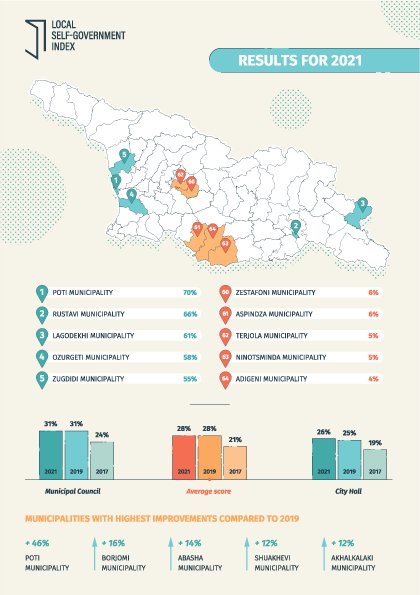


2021 Assessment of Transparency and Accountability of Municipalities - Key Findings
According to the results of the 2021 National Assessment of Transparency and Accountability of Georgian Municipalities, the average score of municipalities is 28% (on a 100% rating scale), which is equal to the 2019 assessment score. It can be thus said that, according to the data of 2021, the rate of transparency and accountability of municipalities has remained practically unchanged.
Based on the results of the 2021 assessment, the score of the first block - proactive disclosure of public information - compared to the results of 2019, improved by 2% (from 25% to 27%), the result remained the same in the second block – Electronic Governance (32%), and in the third block - Citizen Participation and Accountability – the score decreased significantly, by 6% (from 29% to 23%).

According to the evaluators involved in the evaluation process, these results were influenced by several factors.
First, the COVID-19 pandemic. At the time of the assessment, a significant proportion of employees had switched to remote work mode or were unable to perform their duties due to illness. Due to these circumstances, the process of timely receipt of information from municipalities, management, and updating of electronic platforms was often delayed. Restrictions imposed by the pandemic also significantly reduced the ability to communicate directly with the population, which was a major contributing factor in the deterioration of the performance in the third block. To summarize, a large part of the municipalities failed to adapt quickly and effectively to the pandemic situation, which was possible even with more emphasis on e-government tools. The unchanged score of the e-government block in the 2021 assessment and the substantial deterioration of the result of the third block confirm this.
The second factor was the fact that 2021 was the year of local elections. There have been instances where the heads of municipal bodies who no longer participated in the next election have been less enthusiastic about managing current municipal issues, including issues of accountability and transparency. However, in some municipalities, the new leadership that emerged from the by-elections did not share the responsibility for the actions taken by the predecessor, such as submission of activity reports.
The third factor is the unsustainable personnel policies in municipalities. Some municipalities have changed staff who worked in the municipality in 2017-2019 and were familiar with the index and the specifics of the assessment. New employees found it relatively difficult to manage the process, which was reflected in the results.
Moreover, the results of the assessment indicate that geographical (highland) and demographic (ethnic minorities) factors have an impact on the degree of transparency and accountability of municipalities. The results of municipalities with these characteristics are significantly lower than the average of other municipalities. Additionally, the dynamics of improving their results is drastically small. Interestingly, the municipality of the capital of Georgia, where about 1/3 of the population of Georgia lives, lags behind almost all other self-governing cities in terms of the transparency and accountability index.
The positive impact of individual donor support programs and individual initiatives/projects of NGOs on the outcomes of municipalities, including the municipalities involved in the Open Government Partnership (OGP), should also be noted. As a rule, such municipalities show a positive trend in their results.
At the same time, based on the results of all three (2017, 2019, 2021) national assessments, municipalities with consistently high results and positive dynamics were identified (examples are Rustavi, Lagodekhi, Zugdidi, Ozurgeti), indicating their readiness and positive institutional attitude towards transparency and accountability.
There is a growing trend in the awareness and use of the index in both the governmental and non-governmental sectors. For example, the index is used as an indicator of achieving one of the strategic objectives in the government's Decentralization Strategy for 2020-2025 and the Highland Settlement Development Strategy for 2019-2023. At the same time, when assessing the degree of accountability and transparency of municipalities, local NGOs or international organizations often utilize the index figures in their activities.
Despite the availability of the evaluation methodology, there was a lack of knowledge about the index standards/requirements in the municipalities. In response to this challenge, a self-managed distance learning course on index methodology was developed in 2021 (www.tvitmmartveloba.ge). The course is free and can be accessed by any interested person. It will significantly assist municipalities with relevant staff in better understanding the index standards and ensuring that they are met. However, the course can be easily used as a guide at any time.